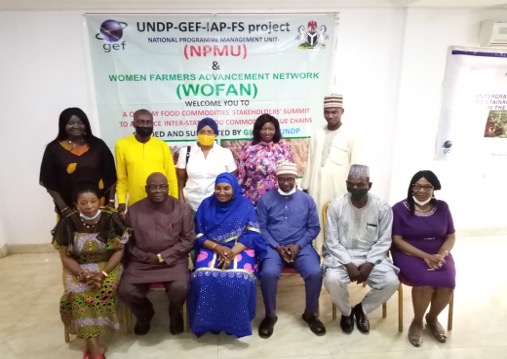
Interest groups in Nigeria’s agricultural and environmental sectors come together to create a multi-stakeholder platform to strengthen sustainable farming practices and ensure food security.
Food shortages and malnutrition are still rife in Nigeria, especially in rural areas, where 70% of the population lives.
Food security policy in Nigeria is determined by the authorities at the national and subnational level, but policies and plans often fail in their objectives to secure a continuous and affordable food supply. Strategies are often not implemented or not communicated effectively to citizens. Inadequate data collection means decision-making around food security programmes, projects and initiatives is often not rooted in a strong evidence base.
To improve advocacy efforts for evidence-based strategies to feed the nation, a new multi-stakeholder platform was launched in March this year, bringing together stakeholders in the agricultural value chain – producers, processors, research institutions and government agencies.
The platform is underpinned by support from the RFS Nigeria project, led by Nigeria’s Federal Ministry of Agriculture and Rural Development (FMARD) in partnership with the United Nations Development Programme (UNDP), and funded by Global Environment Facility (GEF).
The objective of the multi-stakeholder platform is to strengthen collaborative efforts between various partners: private sector actors within agri-food value chains, the Nigerian government, and civil society. Multi-stakeholder platforms are essential when tackling the complex challenges of feeding a nation sustainably. This is especially so in the 21st century, as climate change brings new complexities: food security must be ensured via farming practices that safeguard both land and water.
The platform is also gender-sensitive and aims to integrate women farmers in the agricultural sector to overcome gender disparities within the food system. To ensure the participation of women, the multi-stakeholder platform was founded in partnership with the Women Farmers Advanced Network (WOFAN).

A household name in Nigeria, WOFAN has trained women farmers in sustainable agricultural practices since 1993. WOFAN helps from ground to table: WOFAN helps women grow crops such as rice and groundnuts; it then assists with funding so farmers can expand production and market and sell their yields. In addition, WOFAN continually raises awareness of the importance of food security and nutrition in the communities they assist.
Hajia Salamatu Garba, founder and CEO of WOFAN, is the lead consultant for the multi-stakeholder platform. She has brought together a team of consultants to implement various projects while an executive committee oversees the platform's operations.
Other platform members include Voices for Food Security (VFS), the Association of Small-scale Agro Producers in Nigeria (ASSPIN) and Grow Africa – organisations with a proven track record in advocacy for food and nutrition security.
In addition to assistance with farming and funding, a vital function of the platform involves advocacy for policy changes. Key to fighting hunger is the removal of red tape. Moving forward, the platform will engage the government on issues such as creating market-friendly delivery systems for fertiliser and lifting restrictions on rice imports. Increasing the number of women farmers is also essential in ensuring food security. To obtain this objective, the Nigerian government needs to make funding available in the national budget for supporting female-led farms.
Members of the multi-stakeholder platform will also advocate for fairer trading practices for small-scale farmers. Policies are needed to create more favourable conditions for small-scale food production and distribution, enabling local farmers to enter the markets.
Ms Garba said it had become urgent for interest groups in Nigeria’s agricultural sector to join hands and influence decision-making at the government level to improve food security in the country.
She appealed to the members of the platform to put the interest of the group first. “Most projects die after one or two years because people make money their priority.” People should take ownership of the project and commit themselves to make it work, she said.
A sustainable future requires sustained and steady support from all stakeholders: good policies, like crops, grow best from the ground up.
Subscribe to our monthly newsletter to receive updates on stories directly from the field across all our projects, upcoming events, new resources, and more.